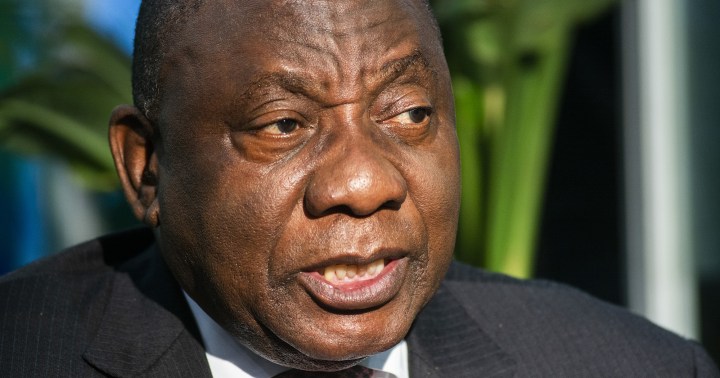BUSINESS MAVERICK: OP-ED
South Africa is stuck in a rut of rot and rhetoric

As retrenchments and economic stagnation fast become the new normal, South Africa’s political establishment is transfixed with talking about the country’s problems. The political status quo has demonstrated an extreme phobia for implementation, which is desperately required as the country enters into economic free fall.
Talk is cheap, so they say. It can also prove to be a costly endeavour if that is the only thing you’re good at doing. Since December 2017, or more precisely, February 2018, South Africa has been in an endless cycle of talking a good game. It has been wonderful to witness.
All the talk made for a nice break from the shenanigans we were forced to endure during the previous administration. It felt like a national group therapy session. The best description of that period would be to categorise it as a dream-like state. In that daydreaming phase, we got an opportunity to reset the national vision and articulate the future goals, which must be attained to achieve an optimal state of governance.
It seems to have worked, but only briefly.
The latest reading of the FNB/BER Consumer Confidence Index says our pessimism levels have dropped back to lows last documented in 2017. That was a time of political turmoil and great uncertainty. It would be no exaggeration to say the country was at a crossroads then.
In the immediate aftermath of Nasrec in December 2017, South Africa was infused with an irrefutable optimism and, even, hope. However, optimism and hope are sustained and fueled by action. Conversely, the absence of action can snuff out the flames of optimism and hope.
Optimism and hope are important prerequisites for a consumption-based economy such as South Africa’s. Without these two elements, retailers and other segments of the economy can brace for more pain as consumers hold on to their hard-earned rands for longer periods.
Those South Africans who are fortunate enough to earn a pay cheque don’t know if their latest earnings will be their last to come in because the country is grappling with recessionary conditions. That means retrenchments are going to be the new normal. This is a disastrous prospect because unemployment is already nearing the 30% mark.
South African consumers have every reason to lose optimism and hope. They don’t know if their heads are next on the retrenchment chopping block.
At their height, optimism and hope have a tendency of masking present realities. These two concepts are fraught with dangers because when citizens are optimistic and hopeful, they are more likely to give politicians room to breathe.
In hindsight, this is one of the biggest mistakes the electorate made in the post-Nasrec context. Optimism and hope gave the incumbents a free ride to coast along on words without backing up promises with actions, or implementation.
Since 2018, the establishment has promised economic renewal, revival, recovery and reform through various platforms, and in many guises. The same message has been repackaged and recycled. But no tangible outcomes have been forthcoming. Instead, the stinging reality of economic stagnation has set in. And the numbers don’t lie, they paint a picture of a country in economic crisis.
Although the political landscape is steeped in reformist discourse and promises of meaningful action, one could make a successful argument that SA Inc is in a state of inertia.
This is apparent in the lack of movement in state-owned entities (SOEs). This is a pity because the country is on a collision course of repeating the mistakes it made in its immediate past.
Most worryingly, the establishment has run out of room to smooth-talk its way out of any adverse sovereign credit rating assessment. A sovereign credit ratings downgrade is a certainty in March 2020, when Moody’s Investors Service is due to make a scheduled review of South Africa.
The SOE conundrum, coupled with the lack of substantive progress on the economic reform agenda, will count against South Africa. In addition, the retrenchment crisis in the private sector will compound the case against the country.
The political establishment is good at diagnosing the country’s problems. However, it has yet to master the art of execution. It has yet to share any progress reports on the promises made in February 2018. It also remains unclear what economic path South Africa is following. This stab-in-the-dark approach is detrimental to the country’s economic pulse. BM


















 Become an Insider
Become an Insider